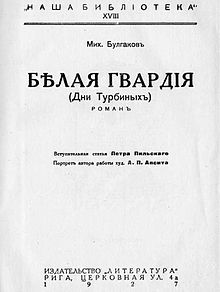The White Guard
 title page, 1927 | |
| Author | Mikhail Bulgakov |
|---|---|
| Original title | Белая гвардия |
| Translator | Marian Schwartz (first complete English edition) |
| Country | Russia |
| Language | Russian |
| Genre | Novel |
| Publisher | Художественная литература (Russian) Yale University Press (English) |
Publication date | 1926 |
Published in English | 2008 |
| Media type | Print (hardback & paperback) |
| Pages | 310 pp |
| ISBN | 978-0-300-15145-9 |
The White Guard (Russian: Белая гвардия) is a novel by the 20th century Ukrainian writer Mikhail Bulgakov. His later work The Master and Margarita brought him posthumous fame.
History[change | change source]
The White Guard first appeared in serial form in the Soviet-era literary journal Rossiya in 1925,[1] but the magazine was closed down before the serial was completed. It was not reprinted in Russia until 1966.
The Day of the Turbins[change | change source]
After the first two parts of The White Guard were published in Rossiya, Bulgakov was invited to write a version for the stage. He called the play The Days of the Turbins. This was produced at the Moscow Art Theatre, to great acclaim:
- "The Day of the Turbins... became a theater legend... The production ran from 1926 to 1941, it had 987 performances... Stalin... saw it no fewer than 20 times".[1]
In fact, the play completely overshadowed the book, which was in any event virtually unobtainable in any form.
Since Bulgakov was refused permission to publish his most important works, he pleaded with Stalin to be allowed to leave the country. Stalin personally arranged for a job for him at the Moscow Arts Theatre. Bulgakov was still writing and re-writing his uncompleted novel, The Master And Margarita, when he died in 1940.
His widow had The White Guard published in large part in the literary journal Moskva in 1966, at the end of the Krushchev era. This was the basis for the English translation by Michael Glenny published in 1971 (New York: McGraw-Hill; London: Collins; reissued 2005 by Academy Chicago Publishers. This lacks the dream flashback sections. In 2008 Yale University Press published a translation by Marian Schwartz of the complete novel, an edition which won an award.
The novel[change | change source]
Set in Ukraine, beginning in late 1918, the novel concerns the fate of the Turbin family as the various armies of the Russian Civil War – the Whites, the Reds, the Imperial German Army, and Ukrainian nationalists – fight over the city of Kyiv. Historical figures such as Petlyura and Pavlo Skoropadsky appear as the Turbin family is caught up in the effects of the October Revolution.
English translations[change | change source]
- translated by Michael Glenny, London, HarperCollins/Havill, 1971; New York: McGraw-Hill 1971; London, Fontana 1973;
- translated by Marian Schwartz, Introduction by Dobrenko, Evgeny: Yale University Press, 2008. ISBN 978-0-300-15145-9
Autobiographical elements[change | change source]
The novel contains many autobiographical elements. Bulgakov gave the younger Turbin brother some of the characteristics of his own younger brother. The description of the house of the Turbins is that of the house of the Bulgakov family in Kyiv. (Today it is preserved and operated as the Mikhail Bulgakov Museum).
References[change | change source]
- ↑ 1.0 1.1 Dobrenko, Evgeny: Introduction to Bulgakov, Mikhail 2008. White Guard. transl. Marian Schwartz, Yale Univerity Press, p. xix. ISBN 978-0-300-15145-9
